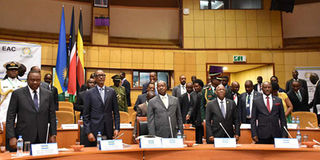Africa isn’t ready for currency unions

Heads of state convene for an East African Community summit. Regional currency projects — such as the East African Community — represent one of the biggest economic policy challenges ever in Africa. PHOTO | FILE | NATION MEDIA GROUP
What you need to know:
- Political leaders in Africa and France say one of their main motives for creating the eco zone is to foster economic integration.
- Africa’s track record on institution building, especially for overseeing sensitive governance issues involving sovereign states, is poor.
West African political leaders recently announced that the CFA franc — created by France in 1945 for its colonies and still used by 14 African countries — will be replaced this year by a new currency pegged to the euro, called the eco.
But lessons from the CFA franc and eurozone experiences raise serious doubts about the region’s preparedness for the new monetary union.
Critics of the CFA franc zone have long focused on France’s perceived dominance, widely believed to have resulted in what late Cameroonian economist Joseph Tchundjang Pouemi called CFA Africa’s “monetary servitude”.
The new reforms aim to change that by loosening ties with France, including by ending the requirement that member states deposit half of their foreign reserves there. (That used to include France’s guarantee of the CFA franc convertibility.)
But the real challenges African monetary unions face have nothing to do with political sovereignty. They relate, instead, to economics.
POLICY CHALLENGE
Despite 75 years of existence, the CFA franc zone is still home to some of the poorest countries (Niger, Mali, Burkina Faso and the Central African Republic).
Even in the richest and most advanced of the CFA franc countries (Cameroon and Côte d’Ivoire), real incomes per capita in 2019 were lower than four decades ago.
That is why the eco — and other regional currency projects, such as the Southern African Development Community (SADC) and East African Community (EAC) — represents one of the biggest economic policy challenges ever in Africa.
The continent comprises small, open economies that rely on trade as the engine of growth.
Because of their production structure and export portfolios, policymakers’ choice of exchange-rate regimes and policies directly determines growth prospects, sectoral and employment dynamics, structural transformation and institutional development.
ECONOMIC INTEGRATION
And a monetary union of poor countries with a common currency pegged to a strong euro will jeopardise the external competitiveness critical to their growth.
Equally worrying, the CFA franc countries do not meet the economic criteria for joining a monetary union. First, trade volumes among them, and within the future eco zone, are too low.
Intra-African trade is less than 15 per cent of regional commerce. When the euro was adopted in 1999, intra-European commerce already represented about 60 per cent of French and German foreign trade.
Political leaders in Africa and France say one of their main motives for creating the eco zone is to foster economic integration.
That is the wrong way around: countries do not adopt a common currency because the trade level among them is low but because they already trade with one another to such an extent that they can substantially reduce their transaction costs by eliminating exchange-rate risk.
EXTERNAL SHOCKS
Secondly, the divergence in industrial structure among the eco zone’s members means that they react to external shocks, such as changes in commodity prices in conflicting ways.
While some of the CFA franc zone countries (Cameroon, Côte d’Ivoire, Gabon and Equatorial Guinea) are oil exporters and benefit from a rise in the oil price, others (CAR, Niger, Mali, and Burkina Faso) are oil importers and would suffer.
Thirdly, despite many treaties and agreements, the free movement of goods and people across national borders — an essential requirement for a monetary union — is heavily constrained in the CFA franc zone.
This “factor mobility” is the best guarantee against external shocks as people can migrate freely across borders to take advantage of employment opportunities.
In the eurozone, free movement of labour enables Greeks to work in Berlin or Paris.
POOR RECORD
By contrast, a Cameroonian worker who wants to migrate to neighbouring Gabon has little chance of getting a work permit — and even if they did, would encounter open, if not violent, hostility from locals embittered by years of unemployment.
Lastly, there is no common fiscal policy in the CFA franc zone and no credible enforcement mechanism to deter excessive indebtedness by individual member states, or to manage sovereign debt collectively.
Moreover, deeper integration of the national banking and financial systems would be needed to facilitate the monitoring, supervision and containment of financial-contagion risks posed by interdependence.
Lastly, Africa’s track record on institution building, especially for overseeing sensitive governance issues involving sovereign states, is poor.
Mr Monga is a senior economic adviser at the World Bank and former VP and chief economist of AfDB and MD at Unido. © Project Syndicate





